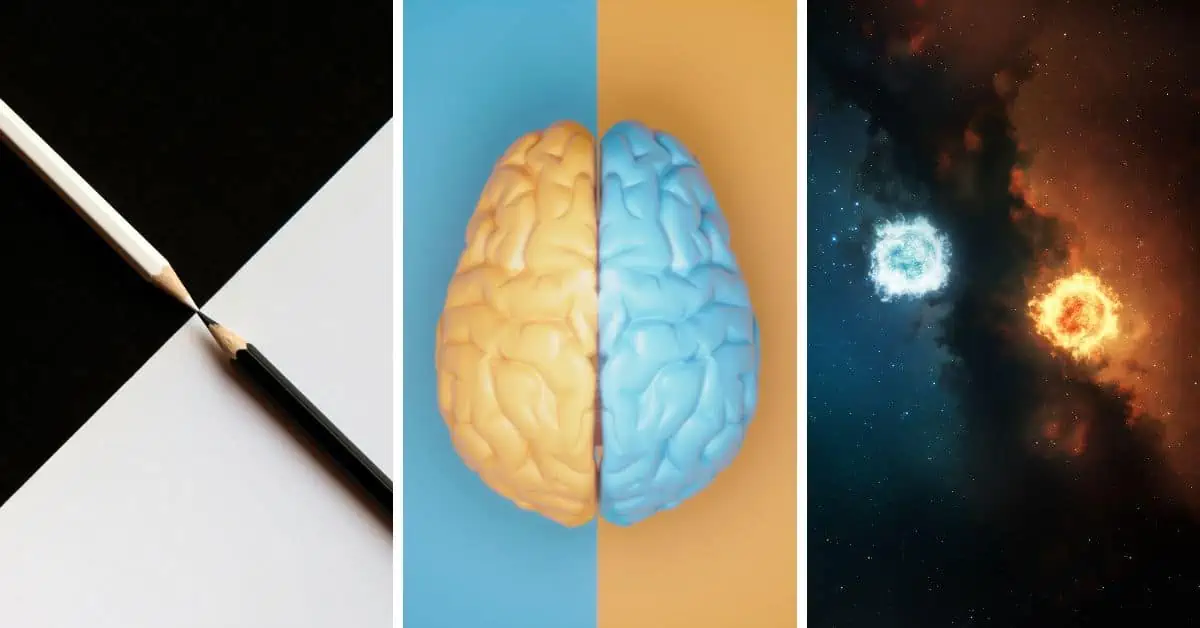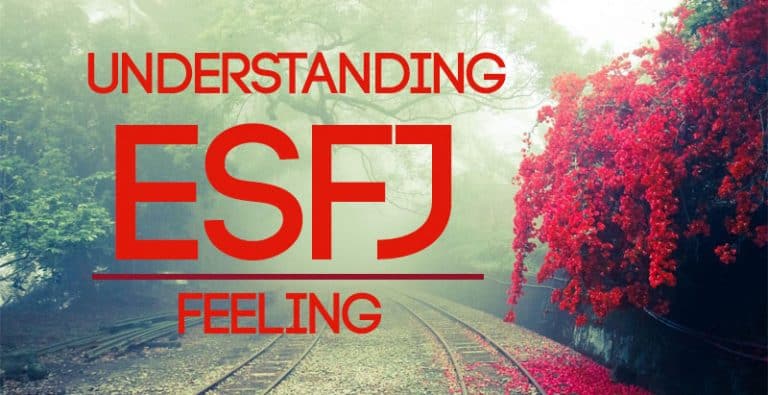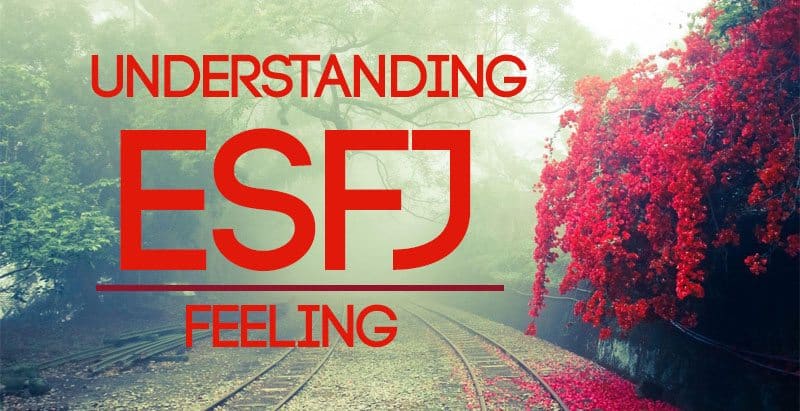The Surprising Contradiction of Each Myers-Briggs® Personality Type
Do you ever feel like personality type descriptions are limiting and narrow? Do you ever feel like people only see half of you and completely ignore (or are blind to) the other half? This is fairly normal and in this article we’ll explain why that’s likely to happen.
Not sure what your personality type is? Take our new personality questionnaire here. Or you can take the official MBTI® here.

The Extroverted and Introverted Side of Your Personality
None of us are pure introverts or extroverts. Each of us has an introverted and an extroverted side. An ENTJ, for example, is likely to show the world the logical, objective side of their personality as well as the impulsive, action-oriented side of who they are. They are less likely to show the world their internal visions, deeper philosophical musings, or soulful, nuanced feelings and values.
Sometimes it can feel like the introverted and extroverted sides of your personality are at war with each other. At other times it can feel like they’re supporting each other in an effortless and breathtaking dance. Either way, outsiders are bound to feel surprised by these very different sides of your personality. Today we’re going to look at each personality and how their type can seem contradictory and surprising to people who know them! Let’s get started!
Table of contents
- The Extroverted and Introverted Side of Your Personality
- The Surprising Contradiction of Each Myers-Briggs® Personality Type
- ENFP Contradictions and Misunderstandings
- ENTP Contradictions and Misunderstandings
- INFP Contradictions and Misunderstandings
- INTP Contradictions and Misunderstandings
- ENFJ Contradictions and Misunderstandings
- ENTJ Contradictions and Misunderstandings
- INFJ Contradictions and Misunderstandings
- INTJ Contradictions and Misunderstandings
- ESFP Contradictions and Misunderstandings
- ESTP Contradictions and Misunderstandings
- ISFP Contradictions and Misunderstandings
- ISTP Contradictions and Misunderstandings
- ESFJ Contradictions and Misunderstandings
- ESTJ Contradictions and Misunderstandings
- ISFJ Contradictions and Misunderstandings
- ISTJ Contradictions and Misunderstandings
- What Are Your Thoughts?
Estimated reading time: 1 minute
The Surprising Contradiction of Each Myers-Briggs® Personality Type
ENFP Contradictions and Misunderstandings
People who know ENFPs are likely to find them energetic, open-minded, and full of ideas and theories. Many are drawn to them for their ingenuity, wit, and creativity. If you look online, you’ll find a plethora of memes and jokes made about ENFPs being distractible, hyperactive, and literally “vomiting rainbows 24/7.” But is this really who they are? Many people would like to reduce them to such trite and narrow adjectives. In fact, some outsiders who look at ENFPs from a distance may think that they are, indeed, distractible, hyperactive, and overly-idealistic.
But are ENFPs really flighty, non-committal, unicorns?
Not so much (unless they’re trying to live up to their stereotypes). Sure, they can be driven from one idea to the next with a fiery passion that few can match. But the contrasting side of this is that they are deeply driven by a complicated set of inner values and ideals. On the outside someone might see an ENFP who flits from idea to idea in a distractible way, but what they don’t see is the ENFP’s inner philosopher who takes every idea, possibility, and dream and lines it up against a set of internal ideas about what is “right” or “wrong.” This inner philosopher is wise, conscientious, and steady. People who limit ENFPs or expect only one thing of them will be surprised when they see how intensely they will stick to their guns on what they believe is right or wrong. Like water-benders, ENFPs seem to dance and fluidly mold ideas out of thin air until they put their inner conviction against one idea and force it to come to fruition in a powerful way. ENFPs can switch from being energetic, vocal, and flexible, to quiet, intense, and mysterious in the blink of an eye if one of their deep inner values is affected in some way.
Read This Next: A Look at the ENFP Leader
ENTP Contradictions and Misunderstandings
In the typology world, ENTPs are often defined as “trolls,” “underachievers,” or “debaters.” While passionately debating and arguing is something they do, indeed, enjoy – it’s not all there is to them as individuals. If you were new to the world of type and learning about ENTPs through online memes or jokes, you’d walk away thinking that ENTPs are geniuses who waste all their mental potential by laying around on the couch arguing with anyone who feels strongly about anything at all.
Is that all ENTPs are?
ENTPs are people of vision, possibility, and innovation. Yes, they like arguing or debating ideas in order to refine their own (and others) thinking. And they may get a hit of satisfaction and dopamine from winning an argument. But besides that, they have a deep well of inner integrity that drives them. However, their integrity is often dismissed or unrecognized by others. For ENTPs, truth – unbiased, undiluted, pure truth – is what drives them. They want to see, and practice, radical honesty. For the ENTP, life isn’t just about laying around on a couch winning pointless arguments. Life is about asking good questions and saying “I don’t know” instead of insisting one does know based on limited information. Healthy ENTPs will critically analyze their own thoughts and argue with themselves as much as they argue with anyone else, in order to discard logical fallacies and biases from their mind. Their need to argue the point isn’t merely to win, it’s to live in accordance with their need for truth and understanding. For a type that is often painted as morally gray, ENTPs are surprisingly principled in their need for honesty with themselves and others.
Read This Next: 12 Amazing Fictional ENTP Characters
INFP Contradictions and Misunderstandings
INFPs are known for their reserved, introspective nature and their profound imagination. When you read about INFPs online you’ll often hear them referred to as “dreamers,” “idealists,” or “healers.” To be frank, you’re likely to find them described as near saintly in their focus on ethics and inner integrity. You might also see them described as ready to burst into tears at the drop of a hat; oversensitive, weak-spirited, or incompetent.
But are these two very extreme descriptions accurate of INFPs? Are they only saints or “sissies?”
The truth is much more nuanced than that (and anyone of any personality type can be a “sissy”, whatever that word entails). While INFPs may seem sensitive or dreamy on the outside, they have an inner core that is far stronger than people realize. Just as Thinking-Perceiving types scrutinize their logic, INFPs scrutinize their values. What is right and wrong? Why is it right and wrong? How can one stay true to what’s “right” while the outside world pushes and pulls in so many different directions? When INFPs are healthy, they have a strong inner core that stays true to its ethics against any outside pressure. That conviction and inner strength is something that shows up in creative ways (books, art, poetry, songwriting, even counseling). While you might think you have INFPs pegged as sensitive dreamers, they’re willing to put a formidable amount of strength behind the values they’ve analyzed the hell out of over their entire lifetimes. And what INFPs value will vary considerably; some INFPs do embody the saintly stereotypes you find online. Other INFPs ascribe to counter-cultural values and appear rebellious, outspoken, and aimed at disrupting the status quo. Some INFPs define their values early on in life, while others are constantly bending and molding them even into their 60s and 70s. You truly never can know what to expect with an INFP.
Read This Next: What Each Myers-Briggs® Personality Type Loves about INFPs
INTP Contradictions and Misunderstandings
Curious and inventive, INTPs are often referred to as the “Mad Scientists” of the typology community. Some people call them “warm robots” and many memes mock their disorganized, quirky nature.
But are INTPs just a bunch of lovable misfits who want to argue on Reddit while streaming anime at 4 AM?
Many times INTPs are underestimated in real life. Teachers see messy worksheets, doodles, or lack of interaction in class (or perhaps too much arguing in class). Parents might see a messy room, someone who gets up too late or has no respect for rank or authority. But if anyone were to really step inside an INTP’s mind, they’d see neatly organized hallways full of very precise information. They’d see debate halls where the INTP is questioning their own thinking. They’d see that INTPs are, in fact, anything but lazy and some of the most mentally hard-working people they’ve ever known. Often, their expertise shows up in the most random moments when an ingenious solution is needed but everyone else is out of ideas.
Read This Next: A Look at the INTP Leader
ENFJ Contradictions and Misunderstandings
ENFJs are regularly referred to as warm, bubbly, and charismatic. They have developed a near cult-like status as the “Morpheus’s” of the personalities (if you haven’t seen The Matrix, I suggest you pause reading this and go watch the movie real quick to know who Morpheus is). Visionary and friendly, they are supposed to be the ultimate inspirers – spurring people towards their potential and counseling them through any personal conflict. In fact, when you look up memes or basic information about ENFJs, you’ll hear more about how they impact others than who they are inside.
But are ENFJs only gatekeepers who help other people reach their dreams? Are they completely selfless and always wearing a smile for others?
While people see primarily the warm, engaging side of the ENFJ, there is an inner, less obvious side that is just as powerful a part of who they are. ENFJs see intrinsic patterns and connections that others are typically blind to. They are energized by inner symbols, visions, and images. In quiet alone time, the ENFJ mind comes alive with inspiring ideas for the future and insights about people and situations that are difficult to explain. There’s a mystical, questioning side to them that is always asking, “What is the deeper meaning of this?” and “What is my destiny?” ENFJs care about living up to their own potential as much as they want to encourage others to live up to theirs. They are dreamers who crave a life beyond the expected, beyond tradition, and beyond day-to-day concerns. Inspiring others is certainly part of their life’s work, but they also want to unlock the mysteries of life with the same passion that INTPs want to discover truth or INFPs want to discover who they really are.
ENTJ Contradictions and Misunderstandings
ENTJs are known for being commanding, logical, and dauntless. If you do a quick search online, you’re bound to see memes that describe them as CEOs, millionaires, or arrogant masterminds that need minions to fulfill their visionary dreams.
But are ENTJs all money-focused entrepreneurial types? Are all ENTJs bossy, arrogant, and burned out from working themselves too hard?
What few type descriptions really delve into with ENTJs is their need to live a life that is congruent with their values. In early life, many ENTJs focus on goals, objectives, and projects that will lead them to successful lives. They enjoy accomplishing things, marking tasks off their to-do lists, and winning. But that’s not all there is to this type. They care about certain things very deeply; for some it could be refugees, for others it could be animal rights. But any ENTJ you speak with will have something that stirs their heart beyond the pursuit of money, success, or productivity. And if you were to look at what ENTJs pursue in their alone time, you’d realize that their Intuitive side gives them a deeper, more insightful inner world than people realize. ENTJs ask themselves a lot of deep, philosophical questions about life. “Why are we here?” “What does this all mean?” “What’s my purpose?” these questions play across their mind on a regular basis. Having a fancy car and a dazzling watch might be nice, but the average ENTJ looks deeper than these surface-level pursuits and tries to find a purpose beyond material success.
INFJ Contradictions and Misunderstandings
If you read many quips or memes about INFJs online, you’ll see their personalities exaggerated. Touted as psychic, all-knowing, or morally superior, many readers are left shaking their heads and thinking that INFJs are more like fantasy movie material than real life individuals.
So what are INFJs? Are they mystical do-gooders who can describe your future within five minutes of meeting you?
In real life, INFJs usually seem much more approachable and down-to-earth than online descriptions would imply. They don’t walk out of their homes holding crystal balls, wizard staffs, and gazing intently into people’s eyes with an all-knowing expression. Chances are, if you meet one of them, they’ll seem approachable, friendly, and maybe even shy. The social or engaging side of the INFJ is usually focused on reading people’s feelings, making people comfortable, and expressing values. The mystical side of the INFJ is more under-wraps, and it works more slowly than stereotypes would imply. INFJs may be the first to say “don’t jump to conclusions” or “nothing is as it seems.” They ruminate over ideas, symbols, information, and imagery for a great while before they make predictions. While many INFJs admit to knowing things inexplicably, very few will verbalize these insights instantaneously for fear of being misunderstood (something that, for many, was constant in childhood). When they do decide to share one of their ideas or insights, it’s always a good idea to listen because I can guarantee they’ve put an enormous amount of analysis into it.
Read This Next: What Makes INFJs Dangerous
INTJ Contradictions and Misunderstandings
Hardly any type gets as much reverence in the typology community as the mastermind INTJs. They are seen as highly intellectual, logical, powerfully all-knowing, and…devoid of emotions.
But are INTJs really all staggeringly intelligent? Are they all completely unfeeling? Is being an INTJ synonymous with being emotionally cold?
The truth is far more nuanced than that. First off, let’s get rid of the idea that INTJs don’t have emotions. Everyone has emotions; ENTPs, INFJs, ESFPs…even animals have emotions. Emotions are just part of life. INTJs don’t have some magical “get out of emotion free” card that nobody else is holding. The inner world of the INTJ is actually surprisingly colorful, vivid, and philosophical. These types may not express their emotions outwardly very much, but they certainly think about them and look for deeper truths within them. They often have a secret artistic or sentimental side that they only share with one (maybe two) other people they trust. And while many INTJs hunger and thirst after knowledge, simply having this personality type doesn’t guarantee you’ll get straight As or be the next Nikola Tesla. In fact, many INTJs are fascinated by the mystical and spiritual sides of life more than cold, hard facts and logic. Their intuition is always looking for a deeper meaning or a deeper level of understanding and purpose. This doesn’t always look like traditional book smarts.
Read This Next: Your INTJ Personality Type and Your Enneagram Type
ESFP Contradictions and Misunderstandings
Constantly underrated, ESFPs are one of the types that have the worst memes made about them and the worst oversimplifications regarding their type (in my experience). Many people write about them as flighty, reckless, and attention seeking. I did a quick Google search of ESFP memes, and every single one was insulting and condescending.
Are ESFPs only fixated on pleasure, partying, and popularity? Are the stereotypes online accurate?
I’m gonna answer that with a resolute “No.” You can never really pin down an ESFP, because their interests and values are so varied. But one thing that all ESFPs have in common is a curiosity about the world and a desire to know how to navigate it with wit and cleverness. Highly independent, they enjoy going after their goals, finding opportunities, and acting quickly to take advantage of what’s available in the moment. They want to make a difference in the world; but not in a “let’s sit around and theorize about world hunger” way. They’re more likely to order 20 pizzas, show up at a homeless shelter, and enjoy a lively meal and game of cards with the people there. ESFPs enjoy seeing opportunities, taking them immediately, and then moving onto the next opportunity. While they may take the occasional selfie or enjoy a lively weekend of partying now and then, that is certainly not all that ESFPs care about. Their ethics matter to them a great deal and they enjoy seeing possibilities to make a real difference in the world.
ESTP Contradictions and Misunderstandings
Energetic and persuasive, ESTPs, like ESFPs, are often poorly stereotyped. If you look up ESTP memes online or read a lot of online content, you’ll see them described as car salesman types, alcoholics, or smooth-talkers who can manipulate anyone into doing anything. I remember reading a serious online article where they were listed as the type most likely to cheat. Don’t ask me where the article got those stats from because I’ve never seen them anywhere. The adventurous, energetic, thrill-seeking side of the ESTP tends to be the side that everyone likes to focus on.
But are ESTPs just a bunch of morally-blind swindlers? Do they live for reckless endangerment and fast-action at the expense of all else?
Again, the truth doesn’t match the stereotype. While ESTPs do enjoy a lively, fun-filled life, they’re also driven to achieve their goals and accomplish tasks, not only for themselves, but for others. They are keen observers, and can easily gauge how people will respond to them. Because of this, yes, they have a casual charm that can help them excel in deal-making. But there’s a deeply logical side to the ESTP that usually stops them from being as reckless as most stereotypes would imply. ESTPs tend to hoard information eagerly. They gather data from the world around them, their experiences, or fact-based literature. It’s pretty easy for them to assess a situation and take stock of risks before doing something. Their logical side tempers their adventurous side and gives them the “street smarts” to stay one step ahead of everyone else. Most ESTPs enjoy helping people in practical ways as well. They get a rush from helping someone in a crisis or offering practical assistance to loved ones. In fact, every ESTP I’ve known has been the “on-call” crisis averter for the people who know them.
ISFP Contradictions and Misunderstandings
If you read very much content about ISFPs you’ll probably walk away thinking that they’re all artists, hippies, or poets. Much attention is given to their creativity and their deep, soulful nature. They are the “Bob Ross’s” of the typology world and have developed a reputation for being thoughtful, emotional, and sensitive.
But is there anything about ISFPs that doesn’t fit these stereotypes? Is there more to them than deep emotions and creativity?
I’ve had many people email me saying that they think they are ISFPs, but they’re worried because they don’t have artistic talent or don’t paint, draw, or write poetry. The truth is, ISFPs can channel their values and detail-orientation into many varied tasks and talents. For some ISFPs, their gift is photography, for others it’s baking, and for others it’s counseling people in crisis situations. Whatever the case, ISFPs have to feel personal conviction about what they’re doing. If the conviction is there, they put their energy into it full-force and are dauntless at accomplishing their vision.
ISFPs can appear contradictory because on the inside they are deeply feeling and sensitive, but on the outside they can appear cool, unaffected, and ready for anything. Their emotions and sensitivities, talked about so often, are often less obvious to the outer eye than one would expect. Many ISFPs internalize their emotions and while they may be feeling intense anger, joy, or sadness, on the outside they may look reserved or unreadable. Because of this mysterious outer demeanor, many people think ISFPs are thinkers rather than feelers initially.
Read This Next: 10 Things You Should Never Say to an ISFP
ISTP Contradictions and Misunderstandings
When one encounters an ISTP, they’re unlikely to sum them up very quickly. ISTPs, much like Han Solo in Star Wars, have a devil-may-care, casual demeanor that is often seen as mysterious and cool. If you look at a lot of stereotypes or memes of this personality, you’ll see them referred to as handy, stoic, or daring. Pictures in memes usually show an ISTP as someone with a leather jacket and a motorcycle or a fantasy hero character from a video game.
But are ISTPs all John Wick’s and Han Solo’s? Can you be an ISTP if you lack physical prowess, don’t ride a motorbike, or don’t tote tools around everywhere you go?
While this type is often romanticized for being the mysterious action hero of the personality community, the real world never is never exactly the same. There are plenty of ISTPs who don’t enjoy fixing cars and don’t resemble video game heroes. For this type, considering and reworking ideas inside their own mind is the most enjoyable thing. They enjoy working with their hands to understand the inner workings of everything around them; but for some that can mean fixing vehicles, for others it can mean experimenting with cooking, and for others it can mean artistic pursuits (Georgia O’Keefe was an ISTP artist!). ISTPs are always studying, always learning, and always experimenting. But what they study can vary considerably and it has to be personally meaningful for them to be interesting. An ISTP might look like a slacker during their school years because they’re learning things that they see as having no immediate application. Then, when they gain independence, they may devour every textbook on a subject they can find just because it now has a personal application. Many a teacher has chastised an ISTP for not putting in effort, only to find them mastering multiple subjects after they leave school and have gained more autonomy.
Read This Next: 12 Amazing Fictional ISTPs
ESFJ Contradictions and Misunderstandings
Like most FJs, ESFJs are genuinely concerned about others and strive to be practical and considerate friends and family members. Many people think that tactfulness, generosity, and social ease are all that ESFJs have to offer. Like ENFJs, they are often seen in context of how they influence others more than for who they are as individuals.
But are ESFJs simply people-pleasers, “mom” types, or caregivers? Is there more to this type than getting nitty-gritty tasks done for others?
While on the outside ESFJs may appear to be all about other people, like all extroverts, they also have a rich and nuanced inner world. These types hold onto specific memories and experiences in their mind and revisit them during peaceful moments. They enjoy creating specific rituals that honor these memories. For example, if on your first date with an ESFJ you watched “When Harry Met Sally,” they may re-watch that movie every year on the anniversary of that first date. As they collect life experiences they flesh out their inner world with memories that are mapped out into rich stories filled with emotion, detail, and beauty. They string together the pivotal moments in life and recall them with depth and sentimental richness. If you’re lucky enough to be in their trusted circle of friends, they can be surprisingly offbeat, silly, and charismatic, retelling the colorful memories from their past and expressing them with creative twists and turns and funny interpretations. Through these interactions you’ll see that there’s more to ESFJs than meets the eye, and they have a silly, playful side that many don’t see at first glance.
ESTJ Contradictions and Misunderstandings
Responsible and hard-working, ESTJs are known to bring structure, order, and a sense of direction to the people they’re around. They naturally take charge of situations and don’t mind critiquing or directing in order to make sure that goals are being achieved in a timely manner. However, some people think that ESTJs are all about work, efficiency, and telling people what to do. There are a lot of exaggerations of this type online, with memes bemoaning their “bossy” or “controlling” nature.
But are ESTJs all about shouting out commands to others? Do these types lack any concern for the weightier matters of life or the feelings of others?
Like all generalizations, this one lacks accuracy. ESTJs put a lot more heart into what they do than people realize. For the ESTJ, life isn’t just about obeying some random set of rules or a hierarchy. They need to have conviction about what they do. They have a deeply feeling, loyal side to them that propels them to take action and improve things. For the ESTJ, providing practical solutions for people is the ultimate way to help. It’s the medicine that will heal the sickness, not a band-aid temporarily providing relief. While ESTJs may not spend a lot of time sharing their feelings or emotionally affirming others, they do believe that their steadfast ability to work and give real, applicable advice will help and encourage people. They notice things about people and situations that few realize they see. Beneath their tough, commanding exterior is usually someone much more compassionate, insightful, and observant than people realize. They just turn their insights and feelings into action, advice, and applicable solutions so that tenderness is not always obvious to outsiders.
ISFJ Contradictions and Misunderstandings
Gentle and nurturing, ISFJs have a reputation for being the quintessential “Moms/Dads” of the type community. They’re seen as being extremely traditional, loyal, and helpful. Many memes mock ISFJs for being “stuck in the past” or codependent.
But are all ISFJs fixated on their pasts to the point where they can’t imagine new possibilities? Do ISFJs only think of others to their own detriment?
The answer isn’t necessarily a black and white one. The truth is that while unhealthy ISFJs may have these tendencies, most average to healthy ISFJs do not. ISFJs are much more colorful, curious, and quirky than people realize. They are actually highly analytical and get a lot of joy from learning, observing, and inwardly piecing together situations and people. Their inner world is filled with rich imagery and memories that they enjoy reflecting on and stringing together into stories, lessons, or comedies. They may even develop humorous takes on their past; laughing about situations that other people would be shocked by. Rarely on the outside does anyone see the quirky, offbeat, or even irreverent thoughts that stream through the ISFJ’s consciousness. As an example, I get a lot of guest posts from various typologists of different personality types (usually intuitives). Without a doubt, the funniest guest posts always come from my ISFJ friend, Jami Cannon. For a type that is often seen as being “uncreative,” I’ve found ISFJs to be surprisingly creative and entertaining. You just may not see that until you’ve developed a fairly close bond.
ISTJ Contradictions and Misunderstandings
Much like ISFJs, ISTJs are seen as being strictly traditional, rule-oriented, and stuck in the past. Like many other sensing types, ISTJs are underestimated and stereotyped in much online content that is unfortunately meant to be taken seriously.
Are ISTJs narrow-minded rule followers who are unable to think outside the box? Do they lack creativity, humor, or wonder?
If you’re only interaction with an ISTJ is for a few minutes each day at work you might think ISTJs are all about the rules. After all, rules make life more efficient for everyone. Having mutually agreed-upon standards saves a tremendous amount of time and conflict. But if you get to know an ISTJ very well, you’ll see that there’s more to them than rules and tradition. Behind their serious, no-nonsense nature you’d find someone who is deeply caring, responsible, and perceptive. People who don’t know ISTJs often perceive them as formal and rigid, but people who know them well are often surprised by their quirky and offbeat sense of humor. In a relaxed state, ISTJs enjoy laughter, irreverent stories, or even exploring controversial or thought-provoking ideas. They often enjoy tinkering creatively on their own; whether that means optimizing a computer system in a way that has never been done before or trying a new woodworking technique. Many ISTJs enjoy crafts and hands-on projects that allow them to apply creativity to a tangible creation. Unhealthy ISTJs may look more like the stereotypes, but average to healthy ISTJs reveal a more playful, witty side of themselves as you get to know them.
What Are Your Thoughts?
Did you enjoy this article? Do you have any ideas or stories to share from your own life? Let us know in the comments!
Find out more about your personality type in our eBooks, Discovering You: Unlocking the Power of Personality Type, The INFJ – Understanding the Mystic, The INTJ – Understanding the Strategist, and The INFP – Understanding the Dreamer. You can also connect with me via Facebook, Instagram, or Twitter!














I’m an ISTJ and this is so, so true. I love rules, I’m efficient, but I also love to create. Sewing and scrapbooking, crocheting and gardening/ landscaping with flowers – I love to make beautiful things. I will make a recipe following all the rules the first time and then change it to make it better (in my opinion!). Or create something new based on what I learned from that recipe.
Shocks me how you couldn’t avoid mentioning stereotypes in this article, guess it’s easier for us to stick to the narrow information we know about people and forget that everyone (ourselves included) has a much richer personality and inner world than what we see and chose to share.
Thanks for this article! But I’m still unsure of how the cognitive processes of each type interact for making those particular contradictions possible and not others.
Still coming to terms with being an ISTJ on the official MBTI after thinking I was an INTJ for over 20 years. Those shorter Internet MBTI tests always labeled me as INTJ. Yet, I find a great deal of agreement with all I am learning about ISTJ. This article continues to help me learn more.
As always thank you Ms. Storm. I have to say as an ISTP type, I agree that some things mentioned are mere stereotypes, so is it a contradiction when we don’t do them?
I would like for other ISTP types to chime in since the contradictions I think of for myself as ISTP is knowing obscure things that when heard by others shows just how nerdy we can be. Since we are good with data, it may surprise some that we may know dates like birthdays, of those we care about.
Another surprise may be volunteering to cut the the neighbor’s grass while cutting yours, especially for elderly neighbors. The latter may not necessarily be a contradiction.
I am always delighted to see articles that delve into more complex nuances and varying perspectives!
I am studying to be a psychologist so I truly love reading about the more complex contradictions of individuals rather than common stereotypes. Each entry is very accurate to the individuals I know and I will share this with others to help facilitate understanding and break the stereotypes.
The INFJ part was very personally accurate as well, although I do actually walk out of the house every day with a staff (although it’s really more of a cane). I have also created a wizard staff, but it is more of a functional prop for events such as Renaissance faires.
Thank you again for your wonderful article; I am now going to attempt to find at least one meme of each type that does not utilize a stereotype.